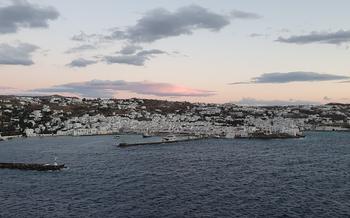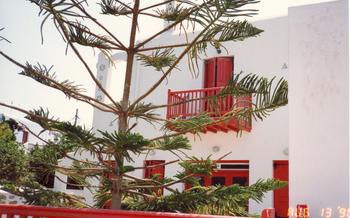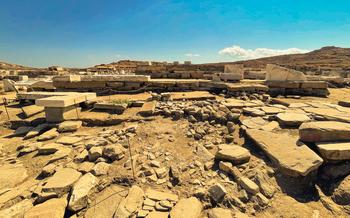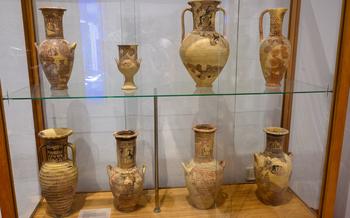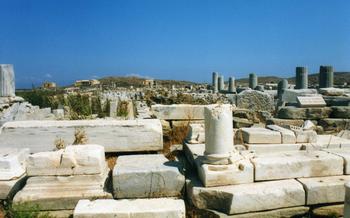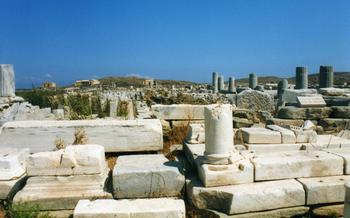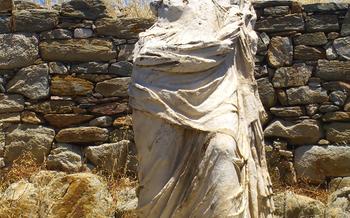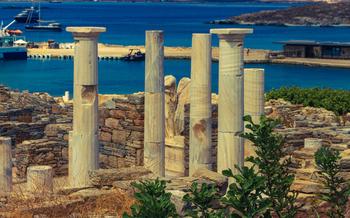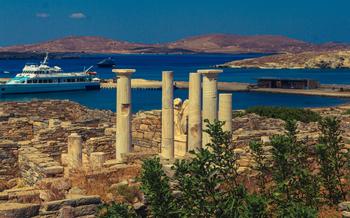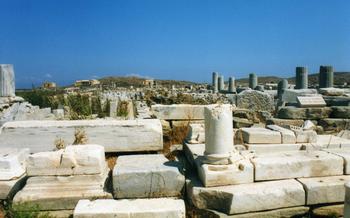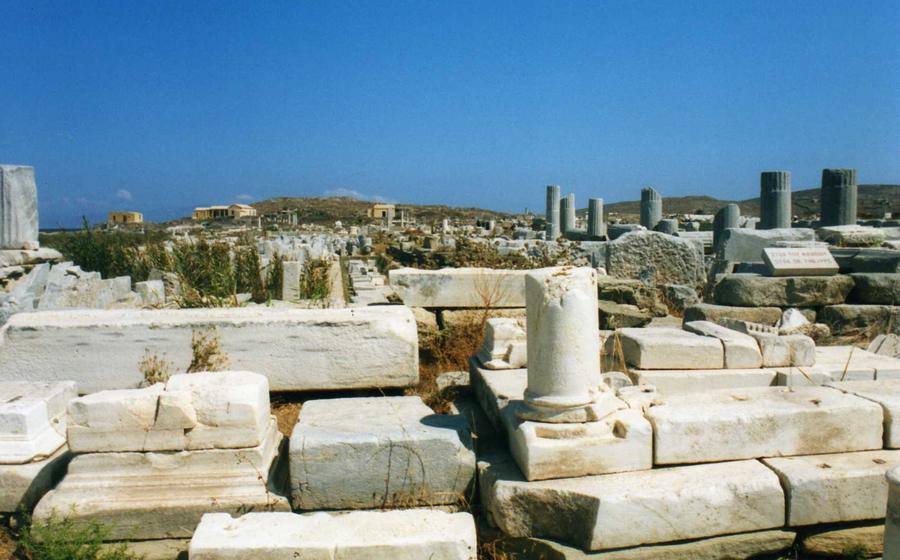
Temple of the Delians at Delos
- Historical Context and Significance
- Location of the Temple
- Delos as a Panhellenic Sanctuary
- Architectural Features
- Delos as a UNESCO World Heritage Site
- Visiting the Temple
- Delos Museum
- Best Time to Visit
- Boat Tours from Mykonos
- Delos Archaeological Site Tour
- Accommodations in Mykonos
- Insider Tip
Historical Context and Significance
The Temple of the Delians, situated on the sacred island of Delos, holds a prominent place in ancient Greek mythology, religion, and architecture. Its construction dates back to the 6th century BC, a period marked by significant religious and political developments in Greece.
The temple was dedicated to Apollo, the god of music, poetry, and prophecy, and his twin sister Artemis, the goddess of hunting, wilderness, and childbirth. According to Greek mythology, Delos was the birthplace of these twin deities, making the temple a site of immense religious significance.
The temple's architectural style reflects the grandeur and artistry of ancient Greece. Built in the Doric order, it showcased the characteristic simplicity and strength of this architectural style. The temple's design incorporated a cella, or inner chamber, where a colossal statue of Apollo once stood, surrounded by a colonnade of fluted columns.
Archaeological excavations at Delos have unearthed a wealth of artifacts and structures, providing valuable insights into the temple's history and religious practices. These discoveries have shed light on the temple's role as a major religious center, attracting pilgrims and worshippers from throughout the Greek world.
Location of the Temple
The Temple of the Delians is situated on the small, uninhabited island of Delos, located in the center of the Cyclades archipelago. Its exact geographical coordinates are 37°23'50"N 25°16'30"E. Delos lies approximately 2 kilometers southeast of the popular tourist island of Mykonos and can be easily reached by boat or ferry from Mykonos Town, which takes around 30 minutes. Other nearby islands, such as Paros, Naxos, and Syros, also offer boat trips to Delos.
Delos is a small island, measuring just 5 kilometers in length and 5 kilometers in width. Despite its size, it played a significant role in ancient Greek mythology and religion, making it a popular destination for visitors interested in exploring the rich history and culture of Greece.
Delos as a Panhellenic Sanctuary
Delos held immense religious significance in ancient Greece, serving as a sacred sanctuary and pilgrimage site for all Greek city-states. The island was considered the birthplace of Apollo and Artemis, twin gods of Greek mythology, and was believed to be under their divine protection. This sacred status made Delos a Panhellenic sanctuary, a central religious site that united the Greek world.
The Panhellenic festivals held at Delos were a testament to the island's religious importance. The most prominent of these was the Delia, a festival that attracted pilgrims and worshippers from across Greece. During the Delia, grand processions, musical performances, and athletic competitions were held to honor Apollo and Artemis. These festivals provided an opportunity for Greeks from different city-states to come together, celebrate their shared religious beliefs, and strengthen their cultural bonds.
Delos also played a crucial role in maintaining peace and unity among Greek city-states through the establishment of the Delian League. This alliance, formed in the 5th century BC, was centered on Delos and aimed to protect Greece from external threats, particularly the Persian Empire. The league's treasury was housed on the island, and its meetings were held in the sacred precinct of Apollo. The Delian League served as a symbol of Greek unity and cooperation, further solidifying Delos' position as a Panhellenic sanctuary.
The religious and political significance of Delos made it a revered and influential site in the ancient Greek world. Its status as a Panhellenic sanctuary reflected the deep spiritual and cultural bonds that united the Greek city-states, transcending political and geographical boundaries.
Architectural Features
The Temple of the Delians is renowned for its unique design and layout, showcasing the architectural prowess of ancient Greece. The complex consists of several structures, each serving a specific purpose. The main temple, dedicated to Apollo, stands as the centerpiece of the complex. Constructed entirely of gleaming white marble, it features a traditional Greek Doric style, characterized by fluted columns and a triangular pediment. The interior of the temple houses a colossal statue of Apollo, a testament to the god's grandeur.
Surrounding the main temple are a series of stoas, or colonnaded walkways, which served as shelters for pilgrims and visitors seeking respite from the sun. These stoas are adorned with intricate carvings and sculptures, depicting scenes from Greek mythology and daily life. Altars, where offerings were made to the gods, are scattered throughout the complex, adding to its sacred atmosphere.
The use of marble and other fine materials in the construction of the temple reflects the importance and reverence accorded to it. The precision and symmetry of the architecture showcase the exceptional craftsmanship of the ancient Greeks, who regarded Delos as a place of profound religious significance.
Delos as a UNESCO World Heritage Site
In recognition of its exceptional cultural and historical significance, Delos was designated as a UNESCO World Heritage Site in 1990. This prestigious designation highlights the site's universal value and the need for its protection and preservation.
The criteria for UNESCO designation are stringent, and Delos meets several of them. Firstly, the site represents a masterpiece of human creative genius, showcasing the architectural achievements of the ancient Greeks. Secondly, it bears witness to a significant cultural tradition, serving as a religious center and pilgrimage site for centuries. Thirdly, Delos is directly associated with events or living traditions of universal significance, as it was the birthplace of Apollo and Artemis, two of the most important gods in Greek mythology.
To ensure the preservation of this remarkable site, ongoing conservation and restoration projects are meticulously carried out. These efforts aim to protect the temple and its surroundings from the elements, human impact, and natural disasters. By safeguarding Delos, we honor the legacy of the ancient Greeks and ensure that future generations can continue to marvel at its beauty and significance.
Visiting the Temple
The Temple of the Delians is a popular tourist destination, and it is easy to see why. The temple is a UNESCO World Heritage Site and offers a glimpse into the ancient Greek world. There are several ways to visit the temple.
Opening hours and admission fees: The temple is open to the public from 8:00 am to 3:00 pm every day. The admission fee is €12 for adults and €6 for children.
Guided tours and self-guided exploration: Guided tours of the temple are available in a variety of languages. Tours typically last for about two hours and provide a comprehensive overview of the temple's history and significance. If you prefer to explore the temple at your own pace, you can purchase a self-guided audio tour or simply wander around the site on your own.
Accessibility for visitors with disabilities: The temple is wheelchair accessible, and there are ramps and elevators to help visitors with disabilities navigate the site.
Tips for visiting the Temple: Be sure to wear comfortable shoes, as there is a lot of walking involved. The sun can be intense, so be sure to wear sunscreen and a hat. Bring plenty of water, as there are no shops or restaurants on the island.
Insider tip: If you are visiting the temple during the summer, be sure to arrive early in the morning or late in the afternoon to avoid the crowds. The temple is also beautiful at night, when it is lit up.
Delos Museum
The Delos Museum is a treasure trove of artifacts that provide a glimpse into the rich history and significance of the island. Located near the ancient harbor, the museum houses a diverse collection of objects excavated from the site, including pottery, sculptures, inscriptions, and jewelry.
Among the highlights of the museum's collection is a stunning array of pottery from various periods of Greek history. From delicate Cycladic figurines to intricately painted Athenian vases, these artifacts showcase the artistic prowess and cultural influences that shaped Delos.
The museum also boasts an impressive collection of sculptures, including marble statues of gods, goddesses, and heroes. One of the most notable pieces is the famous "Nike of Delos," a graceful winged victory that once adorned the temple of Apollo.
Inscriptions found on Delos provide valuable insights into the religious, political, and economic life of the island. These inscriptions range from dedications to the gods to records of financial transactions, offering a glimpse into the daily lives of the ancient Delians.
The Delos Museum is an essential stop for anyone interested in understanding the history and significance of this ancient sanctuary. Its collection of artifacts brings to life the stories of the people who lived, worshipped, and traded on this sacred island, offering a tangible connection to the past.
Best Time to Visit
Timing is crucial when planning a visit to Delos. The island's unique charm is best experienced during the shoulder seasons, spring (April-May) and autumn (September-October), when the weather is still pleasant, and the crowds are significantly smaller.
During these periods, you'll encounter fewer tourists, allowing for a more intimate and immersive exploration of the ancient ruins. The mild temperatures make it ideal for wandering among the archaeological wonders without the discomfort of scorching summer heat.
If you're seeking an even quieter experience, consider visiting Delos during the off-season (November-March). While some facilities and services may be limited, you'll be rewarded with the solitude and tranquility of the island, making it an ideal time for photography and contemplation.
Remember that Delos is exposed to the elements, so dress appropriately and bring sunscreen, a hat, and comfortable shoes. No matter when you choose to visit, Delos promises an unforgettable journey into the heart of ancient Greek history and mythology.
Boat Tours from Mykonos
Visiting Delos from Mykonos is a breeze, with a variety of boat tours offering a range of options to suit every traveler's needs and budget. These tours typically depart from Mykonos Town, the island's main port, and provide a convenient and scenic way to reach the ancient site.
The duration of boat trips to Delos varies depending on the type of tour chosen. Standard boat tours usually take around 2-3 hours, while slower-paced cruises or private boat charters may take longer, allowing for more time to admire the stunning coastline and surrounding islands.
The cost of boat tours to Delos varies depending on the tour operator, the type of boat, and the duration of the trip. Generally, expect to pay around €20-€50 for a standard boat tour, with prices increasing for private charters or more exclusive experiences.
To book a boat tour to Delos, you can either make arrangements through your hotel or travel agency, or book directly with a local tour operator. It's advisable to book in advance, especially during the peak tourist season, to secure your spot and avoid any last-minute disappointments.
Delos Archaeological Site Tour
Exploring the ancient ruins of Delos is best done with a guided tour, as it provides valuable insights into the site's history, mythology, and significance. Guided tours typically cover the main highlights of the archaeological site, including the Temple of Apollo, the Terrace of the Lions, the Agora of the Italians, and the House of Dionysus.
Guided tours are available in various languages and can be booked in advance or upon arrival at Delos. The length of the tours varies, but most last between two and three hours, allowing ample time to explore the site's most important landmarks and learn about their history.
To ensure a comprehensive and enjoyable experience, booking a guided tour with a reputable tour operator is recommended. These operators often have experienced guides who are knowledgeable about the site's history and can provide insightful commentary. Additionally, booking in advance can guarantee a spot on a tour, especially during peak tourist season.
When selecting a guided tour, consider your interests and budget. Some tours may focus on specific aspects of Delos, such as its mythology or architecture, while others may offer a more general overview. Prices for guided tours vary depending on the operator, group size, and inclusions.
Whether you choose to explore Delos independently or with a guided tour, be sure to wear comfortable shoes, bring sunscreen and water, and allow ample time to soak in the beauty and history of this remarkable ancient site.
Accommodations in Mykonos
Mykonos offers a diverse range of accommodation options catering to various budgets and preferences. From budget-friendly hostels and guesthouses to luxurious beachfront resorts, there's something for every traveler.
For those seeking a central location with easy access to the town's vibrant nightlife and shopping, the Mykonos Town area is an ideal choice. Here, you'll find a mix of traditional Greek hotels, modern boutique hotels, and charming guesthouses.
If you prefer a more relaxed and serene atmosphere, consider staying in one of the quieter areas of the island, such as Agios Stefanos or Ornos. These areas offer a tranquil retreat just a short bus ride away from the bustling town center.
To secure the best deals and avoid disappointment, it's advisable to book your accommodation well in advance, especially if you're visiting during the peak tourist season (June to August). Online booking platforms and travel agents can assist you in finding the perfect place to stay based on your budget and requirements.
Insider Tip
Beyond the well-trodden paths of the Temple of the Delians, there lie hidden gems that await the curious explorer. Venture off the main paths and discover the ancient theater, nestled amidst the ruins, where you can imagine the echoes of ancient performances. Seek out the Terrace of the Lions, where majestic marble lions once stood guard, offering a breathtaking panorama of the Aegean Sea.
For an unforgettable photographic experience, time your visit to coincide with the golden hour, when the setting sun casts a warm glow upon the temple, transforming it into a magical spectacle. To fully immerse yourself in the history of Delos, consider combining your visit with a trip to the nearby island of Rhenia, where you can explore the remains of an ancient settlement and enjoy a tranquil escape from the crowds.
